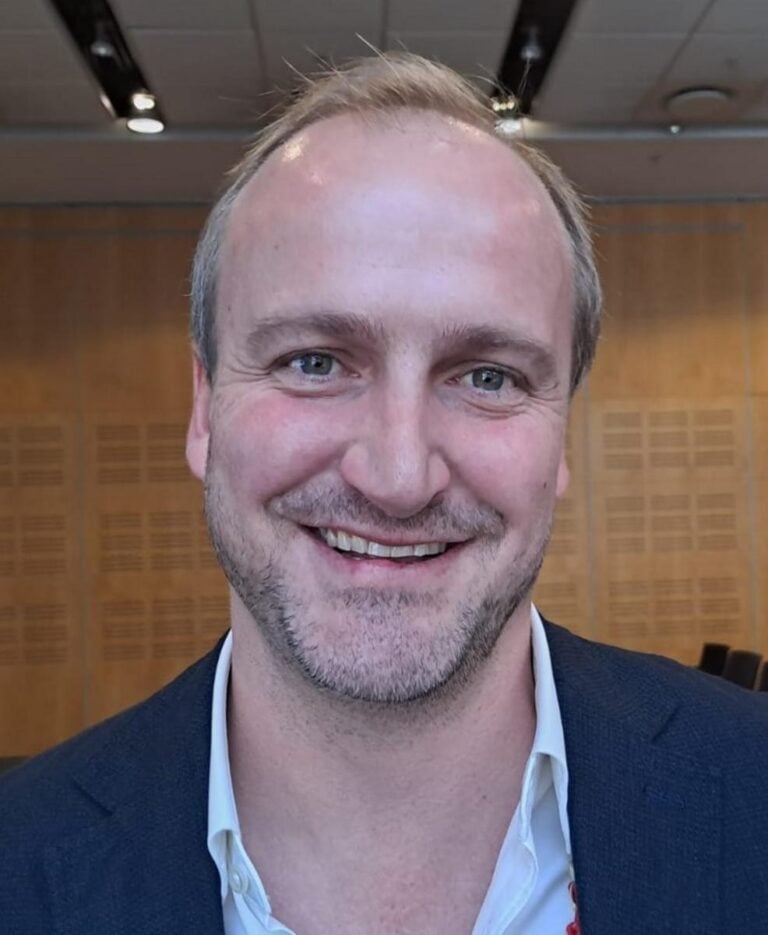
Dr Hendri Hanekom, Group Executive for Strategy and Innovation at Intercare. Photo: CHRIS BATEMAN
That’s according to Dr Hendri Hanekom, Group Executive for Strategy and Innovation at Intercare, which has grown into one of SA’s largest primary care networks over the past two decades.
He was interviewed by Thomas Pellerin, Hub Leader in Manufacturing, Agribusiness and Services at the International Finance Corporation, (IFC), which sponsored a conference entitled “Developing resilient health systems in emerging markets.”
The conference, which hosted some 500 global delegates, was held at the Cape Town International Convention Centre (CTICC) on the Foreshore last month. Pellerin said primary care had been ripe for disruption for some time and Dr Hanekom’s company had ‘upended’ traditional healthcare services in South Africa.
He asked Hanekom how patient income levels drove his company’s service and innovation in a country where private sector patients were predominantly insurance funded.
Hanekom explained; “We’ve moved from an urban setting physical presence to more partnerships outside of major cities in an attempt to improve access. We look at the care continuum, especially in delivery, so we have primary care, day hospitals, sub-acute facilities and have partnered with both Mediclinic and Unjani (nurse-led) Clinics to do this.”
Most appointments are now online
His group had developed its own doctor network through which 60% of all appointments were now online. Having met the not-for-profit Unjani Clinic staff at a previous IFC conference in Miami in 2019, he realised they had similar visions and values.
“Their strategy of access and affordability aligned with ours and we had the healthcare professionals and tech capability to help. We also look at what the market can pay in a particular area and then reduce the end price point to access a GP. It’s not about developing our own funding products but partnering with other funders to enable a care delivery system,” he said.
Covid had boosted virtual consultations and helped many doctors and patients move seamlessly between the digital and physical world. However not all healthcare professionals were comfortable with the virtual world and change management, proper protocols and measurement reporting were proving crucial.
“An acute hospital service is necessary when you start managing populations in the South African context. A lot of your specialists are at acute hospitals and the alliance with MedicClinic made strategic sense,” he said.
Asked whether Intercare sent patients to Mediclinc or whether Mediclinic “offloaded’ some patients to them, Hanekom said the collaboration made referrals to Mediclinic easier, with control afforded by working in partnership with low-cost medical schemes.
“It’s about risk sharing – and the quality of outcomes. You cannot enforce a specific patient journey. Our economics are about volume efficiencies. We want to create access, no matter the income.”
Asked by this journalist what the doctors in his network charged, Hanekom said that if insured, the virtual consult cost about two-thirds of a face-to-face consultation which cost R500.
“It can be lower and include the nurse and doctor fee. There are other insurance companies that provide ‘digital-only’ costs at a lower tariff. It’s quite challenging. With the Discovery model, we take the financial risk and provide the appropriate care at the appropriate time, It’s usually digital-first and when we have face-to-face which we don’t discount.
"We don’t believe in discounting healthcare provider fees because it's unsustainable and you get inferior quality out of the doctors. So, we look at reimbursement models that make sure that doesn’t happen.”
All pathology results went into their electronic digital record and then to the patient, including radiology, dental work, and digital x-rays.
Intercare was exploring customising other delivery models to other African countries while looking for partners on the ground in certain countries, building on the knowledge acquired in South Africa.
Asked by Pellin how difficult it was to ‘onboard’ doctors to his system and/or persuading patients to use the digital interface, Hanekom said it was a ‘major challenge, requiring much education.’
“It’s really important to get capability first and to deliver results. Building trust is key. It all depends on the type of population or markets you service. I do think healthcare should be community-based and Unjani Clinics with their nurse/patient regulations play a big part in education for us,” he concluded.